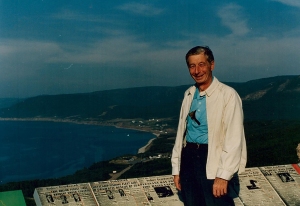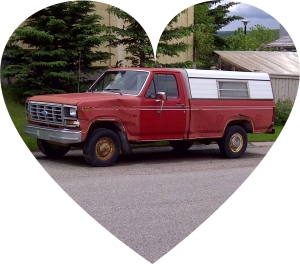I’m about to get maudlin over a vehicle, so if you’d rather have some chuckles today, why not go and check out my very first official blog post, Bad Hotel Karma? I’ll be back to my usual silliness next week.
* * *
Yesterday I said goodbye to a faithful friend: a battered 1983 Ford half-ton. Even though I’d been its official owner for over ten years, I still called it ‘Dad’s truck’.
It’s the truck he drove from Manitoba to Halifax to visit me in 1988. At a miserable time in my life, he drove nearly 10,000 km (6,000 miles) round trip, and we took a long weekend to drive around Cape Breton Island, just him and me.
It was a leisurely trip, pulling in to explore every tiny “point of interest” beside the highway and stopping frequently to snap photos. That was before Dad began to suffer from the increasingly debilitating effects of the lung enzyme deficiency that would slowly steal his breath, and eventually his life. I didn’t spare a thought for the truck at the time; it was just a vehicle that took us where we wanted to go.
Dad used that truck to haul my piano from Manitoba to my apartment in Calgary in 1989. In 1998, he used it to trailer my 1953 Chevy from Manitoba to Calgary. In 2001, I officially ‘bought’ the truck.
I was going through a tough time financially, but Dad wasn’t well enough to drive anymore so the truck had to be sold… and I needed a truck. When I asked if I could buy it, he agreed. But when I went to write the cheque, he eyed me with his usual gentle gravity and said, “Now isn’t really a good time for this, is it? We’ll do it later.”
The truck came to Calgary in the middle of summer, 800 miles in temperatures hovering around 37 degrees Celsius (98 Fahrenheit). It had no air conditioning, and I was sick with a horrible head cold. We crept across the prairies, stopping in every little town for Popsicles and cold water. The truck performed faultlessly. Me? Not so much.
I tried to pay Dad for the truck, several times. At last, I arrived on his doorstep with the cheque already written. And he smiled and said, “Well, I’ve done some deals with the other kids, too, so we’ll just call it even.” The cheque was torn up and the issue was closed. That was my Dad.
By then the truck was twenty years old, but it never let me down. It hauled furniture and pre-fab outhouses and garbage and tools. Its capped box served as an impromptu storage shed, and I slept in it many times while camping. Whenever friends needed to haul something, they knew they could come and borrow it.
The truck lived a hard life. Parked on the street, its side mirror was smashed by vandals and it got egged and spray-painted. Other drivers ran into it, five different times. Sometimes they slid down our treacherous hill on winter ice and only stopped when they hit the truck. Sometimes they backed into the side of it, apparently unable to see a bright red, twenty-foot long vehicle in their rear-view mirror.
But despite their incompetence as drivers, those people restored my faith in humanity. I never found a dent in the truck that wasn’t accounted for. Nobody discounted it as an old junker and drove away without reporting their accident. Each time, our doorbell would ring and some contrite person would apologize profusely for hitting the truck.
Each time, I told them not to worry about it. They’d have enough trouble and expense repairing their own vehicle, and they didn’t need the additional cost of an insurance claim. Dad gave me the truck out of the goodness of his heart. The least I could do was pass it on.
The truck endured the ravages of age and rust and injury, the years and impacts damaging its body but not its tough engine. It developed a cantankerous carburetor that I referred to as my anti-theft device. To start the truck, you had to open the hood, remove the air cleaner, and manually close the sticky choke plate. Then back into the truck to pump the gas for about 30 seconds, after which you could turn the key while still pumping the gas vigorously. But as long as you followed the protocol it never failed to start, even in the dead of winter.
That same cantankerous carburetor required three quick pumps of the gas when starting in first gear. Just a little extra jolt of fuel, or it would stall. The brake drums were out of round, causing a slight surging effect, and the left-turn signal didn’t work unless you knew you had to pull the signal lever slightly outward and toward you. Then it worked just fine.
In its stubborn persistence I saw my Dad’s final battle. The loss of breath, the frequent and increasingly serious illnesses, the wasting and weakening of his once-powerful body. Labouring against the burden of slow suffocation, his cardiac arrhythmia was so pronounced that when I took his pulse the irregular beat would have done a calypso band proud. But just like his truck, his indomitable heart wouldn’t quit, and he endured the suffering and indignities with stoicism and quiet humour.
In recent years we didn’t use the truck often, but I kept it insured and registered, and it kept doing what we asked of it, over and over.
Last spring two young girls in a big half-ton backed into the side of it. Another giant dent; another contrite conversation. Another round of forgiveness with the gentle admonition to drive more carefully in the future. Just the way my Dad would have done it.
I could have called the insurance company then and let them write it off; maybe gotten a couple of hundred bucks. Instead I hung onto the truck, not driving it but keeping it registered and insured and in its place of honour beside our house.
A couple of weeks ago I drove it for the first time since the girls in the half-ton hit it. It started right up as usual, but its shocks were gone. It wallowed through undulations in the pavement like a ship in heavy seas, and its steering wandered dangerously. I wanted to cling to it from sheer sentimentality, but I couldn’t bear to see my poor truck endure more dents, more infirmities. It was too much like watching Dad face a battle he knew he couldn’t win, bravely waiting for the final blow.
In the end, Dad’s every breath was an agonizing struggle. Coughing literally tore him apart, causing a massive hernia. The morning after he underwent surgery to repair it, the surgeon told us he could go home that day. Mercifully, he did go home later that day, but not to any earthly dwelling. It was April 1, 2004. April Fool’s Day. Go figure.
I knew the truck’s time was up, too. It wasn’t safe to drive and it wasn’t practical to fix, and I didn’t want to wait for the day when its heroic old engine finally failed. So I called Donate A Car Canada and yesterday my beloved truck went away for the last time. The Lung Association won’t get much for it, but I’d like to think Dad would be pleased.
Today there’s an empty spot on our street, and in my heart.
Goodbye, old friend. I’ll miss you.

